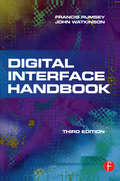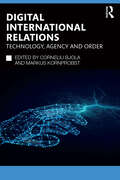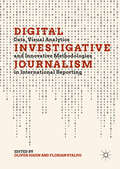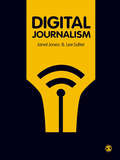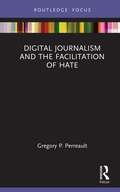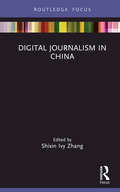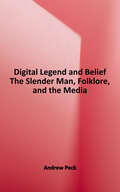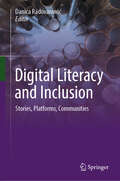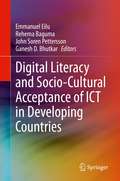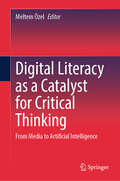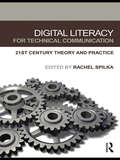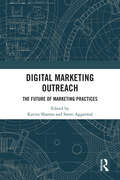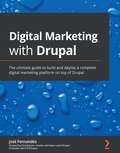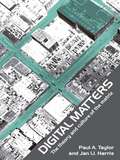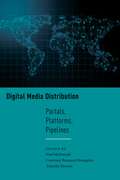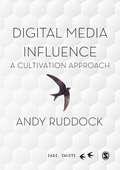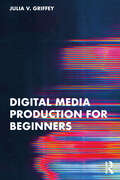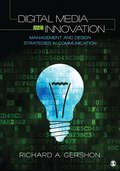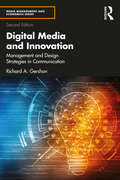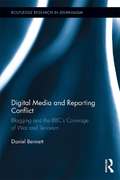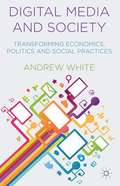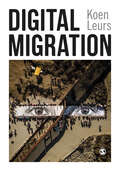- Table View
- List View
Digital Interface Handbook (Music Technology Ser.)
by Francis Rumsey John WatkinsonA digital interface is the technology that allows interconnectivity between multiple pieces of equipment. In other words hardware devices can communicate with each other and accept audio and video material in a variety of forms. The Digital Interface Handbook is a thoroughly detailed manual for those who need to get to grips with digital audio and video systems. Francis Rumsey and John Watkinson bring together their combined experience to shed light on the differences between audio interfaces and show how to make devices 'talk to each' in the digital domain despite their subtle differences. They also include detailed coverage of all the regularly used digital video interfaces. New information included in this third edition: dedicated audio interfaces, audio over computer network interfaces and revised material on practical audio interfacing and synchronisation.
Digital International Relations: Technology, Agency and Order (Routledge Studies in Conflict, Security and Technology)
by Corneliu Bjola Markus KornprobstThis book analyses how digital transformation disrupts established patterns of world politics, moving International Relations (IR) increasingly towards Digital International Relations. This volume examines technological, agential and ordering processes that explain this fundamental change. The contributors trace how digital disruption changes the international world we live in, ranging from security to economics, from human rights advocacy to deep fakes, and from diplomacy to international law. The book makes two sets of contributions. First, it shows that the ongoing digital revolution profoundly changes every major dimension of international politics. Second, focusing on the interplay of technology, agency and order, it provides a framework for explaining these changes. The book also provides a map for adjusting the study of international politics to studying International Relations, making a case for upgrading, augmenting and rewiring the discipline. Theory follows practice in International Relations, but if the discipline wants to be able to meaningfully analyse the present and come up with plausible scenarios for the future, it must not lag too far behind major transformations of the world that it studies. This book facilitates that theoretical journey. This book will be of much interest to students of cyber-politics, politics and technology, and International Relations.
Digital Investigative Journalism: Data, Visual Analytics and Innovative Methodologies in International Reporting
by Oliver Hahn Florian StalphIn the post-digital era, investigative journalism around the world faces a revolutionary shift in the way information is gathered and interpreted. Reporters in the field are confronted with data sources, new logics of information dissemination, and a flood of disinformation. Investigative journalists are working with programmers, designers and scientists to develop innovative tools and hands-on approaches that assist them in disclosing the misuse of power and uncovering injustice. This volume provides an overview of the most sophisticated techniques of digital investigative journalism: data and computational journalism, which investigates stories hidden in numbers; immersive journalism, which digs into virtual reality; drone journalism, which conquers hitherto inaccessible territories; visual and interactive journalism, which reforms storytelling with images and audience perspectives; and digital forensics and visual analytics, which help to authenticate digital content and identify sources in order to detect manipulation. All these techniques are discussed against the backdrop of international political scenarios and globally networked societies. This edited volume, written by renowned international media practitioners and scholars, is full of illuminating insights into digital investigative journalism and addresses professional journalists, journalism researchers and students.
Digital Journalism
by Janet Jones Lee SalterHow can we make sense of the ongoing technological changes affecting journalism and journalists today? Will the new digital generation break down barriers for journalism, or will things just stay the same? These and other pertinent questions will be asked and explored throughout this exciting new book that looks at the changing dynamics of journalism in a digital era. Examining issues and debates through cultural, social, political and economic frameworks, the book gets to grip with today′s new journalism by understanding its historical threats and remembering its continuing resilience and ability to change with the times. In considering new forms of journalistic practice the book covers important topics such as: • truth in the new journalism • the changing identity of the journalist • the economic implications for the industry • the impact on the relationship between the journalist and their audience • the legal framework of doing journalism online. Vibrant in style and accessible to all, Digital Journalism is a captivating read for anyone looking to understand the advent of a new journalism that has been altered by the latest digital technologies.
Digital Journalism and the Facilitation of Hate (Disruptions)
by Gregory P. PerreaultDigital Journalism and the Facilitation of Hate explores the process by which digital journalists manage the coverage of hate speech and "hate groups," and considers how digital journalists can best avoid having their work used to lend legitimacy to hate. Leaning on more than 200 interviews with digital journalists over the past three years, this book first lays the foundation by discussing the essential values held by digital journalists, including how they define journalism; what values they consider essential to the field; and how they practice their trade. Perreault considers the problem of defining "hate" and "hate groups" by the media, acknowledging journalism’s role in perpetuating hate through its continued ideological coverage of marginalized groups. Case studies, including the January 6 U.S. Capitol siege, the GamerGate controversy, and the Unite the Right rally in Charlottesville, help to elaborate on this problem and illustrate potential solutions. Digital Journalism and the Facilitation of Hate draws attention to the tactics of white nationalists in leveraging digital journalism and suggests ways in which digital journalists can more effectively manage their reporting on hate. Offering a valuable, empirical insight into the relationship between digital journalism and hate, this book will be of interest to students, scholars, and professionals of social and digital media, sociology, and journalism.
Digital Journalism in China (Disruptions)
by Shixin Ivy ZhangThis edited collection brings together journalism scholars from mainland China, Hong Kong, the UK and Australia to address a variety of pressing issues and challenges facing digital journalism in China today. While China shares certain affinities with the digital disruption of media in other settings, its experience and articulation of change is ultimately unique. This volume explores the implications of digital media technologies for journalists’ professional practice, news users’ consumption and engagement with news, as well as the shifting institutional, organizational and financial structures of news media. Drawing on case studies and quantitative and qualitative approaches, contributors address questions concerning: whether China is witnessing ‘disruptive’ or ‘sustainable’ journalism; if, and in what ways, digital technologies may disrupt journalism; and whether Chinese digital journalism converges with or diverges from Western experiences of digital journalism. Digital Journalism in China is an important addition to the literature on digital journalism, comparative media analysis, the Chinese Communist Party’s social media strategies, tabloidization trends, and the conflict between newsroom and classroom in journalism education, and will be of interest to advanced students, scholars, and practitioners alike.
Digital Legend and Belief: The Slender Man, Folklore, and the Media
by Andrew PeckThe internet brings new urgency to the study of folklore. The digital networks we use daily amplify legends' capacity to spread swiftly, define threats, and inform action. Using the case of a particularly popular digital bogeyman known as the Slender Man, Andrew Peck brings the study of legends into the twenty-first century. Peck explains not only how legends circulate in the digital swirl of the internet but also how the internet affects how legends seep into our offline lives and into the mass media we consume. What happens, he asks, when legends go online? How does the internet enable the creation of new legends? How do these ideas go viral? How do tradition and technology interact to construct collaborative beliefs? Peck argues that the story of the Slender Man is really a story about the changing nature of belief in the age of the internet. Widely adopted digital technologies, from smartphones to social media, offer vast potential for extending traditional and expressive social behaviors in new ways. As such, understanding the online landscape of contemporary folklore is crucial for grasping the formation and circulation of belief in the digital age. Ultimately, Peck argues that advancing our comprehension of legends online can help us better understand how similar belief genres like fake news, conspiracy theories, hoaxes, rumors, meme culture, and anti-expert movements are enabled by digital media.
Digital Literacy and Inclusion: Stories, Platforms, Communities
by Danica RadovanovićAmid the opportunities and challenges we face at the dawn of the fifth industrial revolution, Digital Literacy and Inclusion presents a carefully curated selection of case studies, theories, research, and best practices based on digital literacy as a prerequisite for effective digital inclusion.More than a dozen experts provide deep insights in stories, research reports, and geographical studies of digital literacy and inclusion models, all from a multi-disciplinary perspective that includes engineering, social sciences, and education. Digital Literacy and Inclusion also highlights a showcase of real-world digital literacy initiatives that have been adopted by communities of practice around the globe.Contributors explore myriad aspects and modalities of digital literacy: digital skills related to creativity, urban data literacy, digital citizenship skills, digital literacy in education, connectivity literacy, online safety skills, problem-solving and critical-thinking digital skills, data literacy skills, mobile digital literacy, algorithmic digital skills, digital health skills, etc. They share the principles and techniques behind successful initiatives and examine the dynamics and structures that enable communities to achieve digital literacy efficiently and sustainably. Their practical solutions, propositions, and findings provide theoretically grounded and evidence-based facts that inform interventions intended to ensure that all citizens have and can enhance their digital literacy while meaningfully and responsibly participating in the digital economy and society.The ideas and histories in this book will appeal to scholars and researchers in the social sciences, engineering, education, sustainable digital technologies, and transformation, and will also be of interest to practitioners in industry, policy, and government.
Digital Literacy and Socio-Cultural Acceptance of ICT in Developing Countries
by Emmanuel Eilu Rehema Baguma John Soren Pettersson Ganesh D. BhutkarThis book discusses the role of human computer interaction (HCI) design in fostering digital literacy and promoting socio-cultural acceptance and usage of the latest ICT innovations in developing countries. The book presents techniques, theories, case studies, and methodologies in HCI design approaches that have been used to foster digital literacy, break the socio-cultural barriers to ICT adoption, and promote the widespread usage of the latest innovations in the health, agriculture, economic, education and social sectors in developing countries. The authors provide insights on how crossing disciplines in HCI such as usability design, user centered design, user experience, anticipated user experience, technology acceptance design, persuasive design, philosophical designs, motivational design, social-cultural oriented designs, and other HCI design approaches have promoted digital literacy and stimulated socio-cultural acceptance and the usage of the latest ICT innovations. The book is relevant in academic, industry and government.Presents theoretical, practical, and socio-cultural approaches to digital literacy challenges in developing countries;Discusses recent ICT and HCI innovations used to transform the health, agriculture, economic, education and social sectors in developing countries;Provides insights on design opportunities and challenges presented in countries where digital literacy is very low and with complex socio-cultural dynamics.
Digital Literacy as a Catalyst for Critical Thinking: From Media to Artificial Intelligence
by Meltem ÖzelThis book explores the many forms in which literacy—the ability to read and write—can manifest. Media and Information Literacy is the ability to use different types of media in a reliable, intelligent, and responsible manner. The development of literacy competence has occurred in parallel with the developments in the historical period. Different types of media have emerged in the historical process, and accordingly, the competences of individuals have developed and diversified and have had socio-cultural reflections. Media and Information Literacy (MIL) is harmonious because it encompasses the various concepts of connected literacies. These include: media literacy, information literacy, freedom of expression and information literacy, library literacy, news literacy, computer literacy, internet literacy, digital literacy, cinema literacy, games literacy, television literacy, advertising literacy, and other types of literacies. Media and Information Literacy is extremely important today because it enables critical thinking. An individual who is Media and Information literate can distinguish between reliable sources of information, determine the role of media in culture, and be responsible for understanding the impact of mass communication when switching between different media platforms. Media and Information Literacy is considered a set of competencies and skills that are close to the concepts of online and offline media, critical thinking, media use, information and source awareness, digital citizenship, and active participation. In particular, Media and Information Literacy skills are skills that are encouraged to combat social challenges such as misinformation and disinformation, extremism, cyberbullying and online hate speech, various cybercrimes (blackmail, data theft, human rights violations, etc.). Media and Information Literacy is a set of competencies that enable a person to access media, analyze media content, create new media messages, reflect on existing media content, and take action with media.
Digital Literacy for Technical Communication: 21st Century Theory and Practice
by Rachel SpilkaDigital Literacy for Technical Communication helps technical communicators make better sense of technology’s impact on their work, so they can identify new ways to adapt, adjust, and evolve, fulfilling their own professional potential. This collection is comprised of three sections, each designed to explore answers to these questions: How has technical communication work changed in response to the current (digital) writing environment? What is important, foundational knowledge in our field that all technical communicators need to learn? How can we revise past theories or develop new ones to better understand how technology has transformed our work? Bringing together highly-regarded specialists in digital literacy, this anthology will serve as an indispensible resource for scholars, students, and practitioners. It illuminates technology’s impact on their work and prepares them to respond to the constant changes and challenges in the new digital universe.
Digital Marketing Outreach: The Future of Marketing Practices
by Kavita Sharma Swati AggarwalThis book studies the use of digital marketing across the economic, social, and political sectors of India. It looks at diverse areas of business and non-business activities involving the use of digital platforms to augment marketing initiatives and improve reach, sales, and social media engagement. The volume analyses various themes including viral marketing, influencer marketing, webrooming behaviour, online impulse buying, telemedicine, social media advertising, and app-based cab services. It examines the role of digital marketing in creating a positive and favorable brand image for organisations by advertising their social responsiveness on social media and studies the influence of political brand value on social media activities. The authors also provide insight into changing trends within consumer behaviour, reflect on future challenges within the field, and highlight areas of growth. An important contribution to the study of new and emerging marketing practices, the book will be indispensable for students, researchers and teachers of communication, marketing, brand management, social media marketing, advertising, e-business, digital humanities, and consumer behaviour.
Digital Marketing with Drupal: The ultimate guide to build and deploy a complete digital marketing platform on top of Drupal
by Jose Fernandes Dries BuytaertSupercharge your digital marketing services by building your knowledge to become a skilled digital marketer with the power of DrupalKey FeaturesApply proven marketing techniques using real-world examples of a Drupal development agency and an e-commerce storeDiscover a checklist of nearly 300 must-do activities to ensure that no task is overlookedIntegrate Drupal with other third-party marketing applications and systemsBook DescriptionDrupal is an open-source platform for building ambitious digital experiences. With this practical guide to digital marketing, developers working with Drupal will be able to put their knowledge to work and boost the performance of their online marketing campaigns. Complete with step-by-step explanations of essential concepts, practical examples, and self-assessment questions, this book will take you through the most popular digital marketing techniques and how to apply them, including content marketing, email marketing, social media marketing, SEO, SEM, CRM, and marketing automation, and the latest developments in website personalization and AI marketing. Once you've learned the fundamentals of digital marketing, you'll see how to apply them to your Drupal website or online store. In addition, you'll discover how Drupal can help you better manage your tasks and automate some of them. The book will help you discover the free modules available, how to use them, and how to integrate Drupal with external marketing-related platforms and services. By the end of this Drupal digital marketing book, you'll be able to build and deploy a complete digital marketing platform on top of Drupal to reach a greater audience and achieve online success.What you will learnExplore the most successful digital marketing techniquesCreate your digital marketing plan with the help of Drupal's digital marketing checklistSet up, manage, and administer all the marketing components of a Drupal websiteDiscover how to increase the traffic to your Drupal websiteDevelop and implement an e-commerce marketing strategy for your Drupal Commerce storeManage your daily marketing activities using DrupalGet started with customizing your consumers' digital experienceFind out what's next for Drupal and digital marketingWho this book is forThis book is for Drupal site builders, digital marketers managing Drupal websites marketing and communication, digital or Drupal agency owners, marketing consultants, and anyone managing a Drupal website or e-commerce store. Basic knowledge of Drupal architecture and marketing concepts and related techniques is necessary.
Digital Matters: The Theory and Culture of the Matrix
by Paul Taylor Jan HarrisAnalyzing the complex interaction between the material and immaterial aspects of new digital technologies, this book draws upon a mix of theoretical approaches (including sociology, media theory, cultural studies and technological philosophy), to suggest that the ‘Matrix’ of science fiction and Hollywood is simply an extreme example of how contemporary technological society enframes and conditions its citizens. Arranged in two parts, the book covers: theorizing the Im/Material Matrix living in the Digital Matrix. Providing a novel perspective on on-going digital developments by using both the work of current thinkers and that of past theorists not normally associated with digital issues, it gives a fresh insight into the roots and causes of the social matrix behind the digital one of popular imagination. The authors highlight the way we should be concerned by the power of the digital to undermine physical reality, but also explore the potential the digital has for alternative, empowering social uses. The book’s central point is to impress upon the reader that the digital does indeed matter. It includes a pessimistic interpretation of technological change, and adds a substantial historical perspective to the often excessively topical focus of much existing cyberstudies literature making it an important volume for students and researchers in this field.
Digital Media Distribution: Portals, Platforms, Pipelines (Critical Cultural Communication)
by Timothy Havens Courtney Brannon Donoghue Paul McDonaldA deep dive into the new era of digital content production and distributionIn the twenty-first century, the platforms that both create and host content have become nearly as important as media itself. Companies such as Netflix, Spotify, and YouTube have attained a massive hold on the public imagination and have become an almost ineluctable part of people’s everyday lives. While the workings of media distribution had until very recently remained inconsequential to the average consumer, the recent popularization of various online platforms has made the question of distribution immediate to everyone. Digital Media Distribution: Portals, Platforms, Pipelines provides a timely examination of the multifaceted distribution landscape in a moment of transformation and conceptualizes media distribution as a complex site of power, privilege, and gatekeeping. These tensions have local, national, and global consequences on the autonomy of creative workers, as well as on how we gain access to, engage with, and understand cultural products. Drawing on original research into distribution practices in industries as diverse as television, film, videogames, literature, and adult entertainment, each chapter explores how digitization has changed media distribution and its broader economic, industrial, social, and cultural implications.Bringing together experts from around the world and across the media industries, Digital Media Distribution: Portals, Platforms, Pipelines presents a vast array of critical approaches and illustrative case studies for understanding the factors that have an impact on the way media travels and moves throughout our digital lives.
Digital Media Influence: A Cultivation Approach (SAGE Swifts)
by Andy RuddockPopulism, misogyny, rampage murders. Digital media seem to lie at the heart of sinister, intractable social challenges. Curiously, the very societies who fear such things are often dismissive of media research. Addressing key issues affecting global media industries, this book explains how to solve the present conundrum by appreciating the historical development of cultivation theory. Digital Media Influence ties cultivation themes, such as mean world syndrome, mainstreaming, the celebration of white male violence, the ridiculing of ageing women, the inhibition of activism, the mediatisation of religion and the erosion of trust in education, with contemporary digital media case studies. Considering the aftermath of the Parkland murders, political memes, Islamophobia, the fate of female reality TV stars and the bad press directed at media education, Ruddock shows how these phenomena are born of media practices that cultivation theory began to dissect in the 1950s. Paying close attention to the life and work of George Gerbner, Digital Media Influence locates today’s questions in the historical forces and relationships that moved media industries closer to the heart of global politics in the mid-20th century. It makes Gerbner’s work relevant to all critical media researchers by providing a theoretical, methodological and historical steer for understanding new media influences. In explaining how one of the world’s leading media theories developed in relation to intriguing historical circumstances – many of them deeply personal – this book helps researchers of all levels to find their voice in writing on media issues.
Digital Media Influence: A Cultivation Approach (SAGE Swifts)
by Andy RuddockPopulism, misogyny, rampage murders. Digital media seem to lie at the heart of sinister, intractable social challenges. Curiously, the very societies who fear such things are often dismissive of media research. Addressing key issues affecting global media industries, this book explains how to solve the present conundrum by appreciating the historical development of cultivation theory. Digital Media Influence ties cultivation themes, such as mean world syndrome, mainstreaming, the celebration of white male violence, the ridiculing of ageing women, the inhibition of activism, the mediatisation of religion and the erosion of trust in education, with contemporary digital media case studies. Considering the aftermath of the Parkland murders, political memes, Islamophobia, the fate of female reality TV stars and the bad press directed at media education, Ruddock shows how these phenomena are born of media practices that cultivation theory began to dissect in the 1950s. Paying close attention to the life and work of George Gerbner, Digital Media Influence locates today’s questions in the historical forces and relationships that moved media industries closer to the heart of global politics in the mid-20th century. It makes Gerbner’s work relevant to all critical media researchers by providing a theoretical, methodological and historical steer for understanding new media influences. In explaining how one of the world’s leading media theories developed in relation to intriguing historical circumstances – many of them deeply personal – this book helps researchers of all levels to find their voice in writing on media issues.
Digital Media Production for Beginners
by Julia V. GriffeyWritten for the non-specialist media producer, this book offers a practical and engaging guide to basic digital media production using modern equipment and software.As media production tools and software become more pervasive and traditional media jobs scarcer, today’s media professionals are now expected to be content creators across multiple forms of media, often working with little more equipment than a smartphone. In this accessible manual, Griffey explains how well-crafted media can help sell products, bolster subscriptions, and influence public opinion—and how to go about crafting it in a landscape of high-speed social media consumption. Topics covered include the basics of photography, film, video, and audio production, as well as animation and building websites. Readers will learn not just how to shoot or record content, but also how to edit, compress, and share it, considering the most appropriate file types, equipment, software, and platforms to use for each scenario. After reading this book, students will understand best practices associated with almost every area of media production and possess the essential skills to get the job done.This book is an essential companion for students in communication disciplines, including PR, advertising, journalism, and marketing, looking for a solid grounding in digital media production to prepare them for the competitive job market.
Digital Media and Innovation: Management and Design Strategies in Communication
by Dr Richard A. GershonDigital Media and Innovation, by Richard A. Gershon, takes an in-depth look at how smart, creative companies have transformed the business of media and telecommunications by introducing unique and original products and services. Today's media managers are faced with the same basic question: what are the best methods for staying competitive over time? In one word: innovation. From electronic commerce (Amazon, Google) to music and video streaming (Apple, Pandora, and Netflix), digital media has transformed the business of retail selling and personal lifestyle. This text will introduce current and future media industry professionals to the people, companies, and strategies that have proven to be real game changers by offering the marketplace a unique value proposition for the consumer.
Digital Media and Innovation: Management and Design Strategies in Communication
by Dr Richard A. GershonDigital Media and Innovation, by Richard A. Gershon, takes an in-depth look at how smart, creative companies have transformed the business of media and telecommunications by introducing unique and original products and services. Today's media managers are faced with the same basic question: what are the best methods for staying competitive over time? In one word: innovation. From electronic commerce (Amazon, Google) to music and video streaming (Apple, Pandora, and Netflix), digital media has transformed the business of retail selling and personal lifestyle. This text will introduce current and future media industry professionals to the people, companies, and strategies that have proven to be real game changers by offering the marketplace a unique value proposition for the consumer.
Digital Media and Innovation: Management and Design Strategies in Communication (Media Management and Economics Series)
by Richard A. GershonThis fully updated second edition explores the importance of innovation and innovative thinking for the long-term success of today’s leading media, telecommunications, and information technology companies.The book takes an in-depth look at how smart, creative companies have transformed today's digital economy by introducing unique and highly differentiated products and services. This edition provides a detailed overview of intelligent networks and analyzes disruptive business models and processes from companies involved in social media, artificial intelligence, the metaverse, smart cities, and robotics among other emerging areas. From Apple to Zoom, this book considers some of the key people, companies, and strategies that have transformed the communication industries. Exploring the power of good ideas, this book goes inside the creative edge and looks at what makes such companies successful over time.Digital Media and Innovation is suited to advanced undergraduate and graduate courses in media management, media industries, communication technology, and business management and innovation, and provides up-to-date research for media and business professionals.
Digital Media and Reporting Conflict: Blogging and the BBC’s Coverage of War and Terrorism (Routledge Research in Journalism #6)
by Daniel BennettThis book explores the impact of new forms of online reporting on the BBC’s coverage of war and terrorism. Informed by the views of over 100 BBC staff at all levels of the corporation, Bennett captures journalists’ shifting attitudes towards blogs and internet sources used to cover wars and other conflicts. He argues that the BBC’s practices and values are fundamentally evolving in response to the challenges of immediate digital publication. Ongoing challenges for journalism in the online media environment are identified: maintaining impartiality in the face of calls for more open personal journalism; ensuring accuracy when the power of the "former audience" allows news to break at speed; and overcoming the limits of the scale of the BBC’s news operation in order to meet the demands to present news as conversation. While the focus of the book is on the BBC’s coverage of war and terrorism, the conclusions are more widely relevant to the evolving practice of journalism at traditional media organizations as they grapple with a revolution in publication.
Digital Media and Risk Culture in China’s Financial Markets (Routledge Research in Digital Media and Culture in Asia)
by Zhifei MaoThis book analyzes the risk cultures in China that have emerged from the entanglement of new communication technologies and financial markets, examining the role that digital media play in Asian modernity and offering an alternative narrative to that of the West. The book illustrates the impact of exclusively Chinese digital media on power dynamics within risk definition, arguing that information and communication technologies (ICTs) empower individuals, enabling them to compete with an expert-oriented risk culture controlled by Government- and banker-led media outlets. With struggles, competitions, compromises, and confrontations, major communicators in financial world are collectively producing risk cultures based on interpersonal relations instead of contractual obligations, in which insider information is valued over professional analysis. Meanwhile, investors are trapped in a risk culture paradox that they themselves have produced, as they attempt to take advantage of other actors’ uncertainties and eventually produce risks for the entire market.
Digital Media and Society
by Andrew WhiteReferencing key contemporary debates on issues like surveillance, identity, the global financial crisis, the digital divide and Internet politics, Andrew White provides a critical intervention in discussions on the impact of the proliferation of digital media technologies on politics, the economy and social practices.
Digital Migration
by Koen Leurs"A revelation for digital researchers and a provocation for migration scholars… It introduces an insightful, inspiring, and inviting way of making sense of the messiness without losing hope of changing things." - Nishant Shah, Chinese University of Hong Kong "A must read for everyone who is concerned with questions of human mobility, media and communications and the digital border." - Myria Georgiou, LSE "A much-needed addition to scholarship on mobility, technology, and migration… The book is poised to become a touchstone text." - C.L. Quinan University of Melbourne In contemporary discussions on migration, digital technology is often seen as a ′smart′ disruptive tool. Bringing efficiencies to management, and safety to migrants. But the reality is always more complex. This book is a comprehensive and impassioned account of the relationship between digital technology and migration. From ′top-down′ governmental and corporate shaping of the migrant condition, to the ′bottom-up′ of digital practices helping migrants connect, engage and resist. Taking an interdisciplinary approach, Digital Migration explores: The power relations of digital infrastructures across migrant recruitment, transportation and communication. Migrant connections and the use of digital devices, platforms and networks. Dominant digital representations of migrants, and how they’re resisted. The affect and emotion of digital migration, from digital intimacy to transnational family life. How histories of pre and early-digital migration help us situate and rethink contemporary research. The realities of researching digital migration, including interviews with leading international researchers. Critical yet hopeful, Koen Leurs opens up the unequal power relations at the heart of digital migration studies, challenging us to imagine more just alternatives. Koen Leurs is an Associate Professor in Gender, Media and Migration Studies at the Graduate Gender Program, Department of Media and Culture, Utrecht University, the Netherlands. All author royalties for this book will be donated to the Alarm Phone, a hotline for boatpeople in distress.
